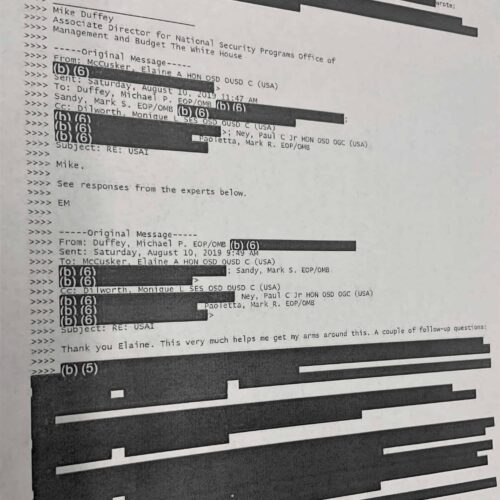Introduction
The Freedom of Information Act is a federal law that grants the public access to information from government agencies. When the government doesn’t want to fork over documents we should have access to, we sue. (And sue. And sue. And sue.) FOIA lawsuits are part of the aggressive efforts our newsroom takes to get the information the public needs. Behind all this is our FOIA expert, research editor Peter Newbatt Smith.
How does FOIA work?
The Freedom of Information Act applies to every federal agency, but not Congress, the federal courts, or some offices within the White House. Anyone can submit a request for records to one of these agencies, and the agency is required to search for records matching the request and to make them available. There are several exceptions written into the law, allowing the withholding of classified information and information that would violate personal privacy, among other categories.
Can you provide a quick explainer or recap of some of your past Public Integrity FOIA experiences?
The FOIA case that’s most memorable to me is, naturally, my first one. The court issued its decision on my birthday, and the judge agreed almost completely with the arguments I had made. And that wasn’t even the best birthday present I received — I proposed to my now-wife on the same day. Unfortunately, when we received the documents we had requested under FOIA, they weren’t very newsworthy. The marriage, on the other hand, has been an unqualified success.
How did you get the story? What led you to pursue it?
This most recent case grew out of FOIA requests in late September by Jeff Smith, our national security editor. When several congressional committees subpoenaed a similar but larger set of records, I half expected the information would be made public before we received a response to our FOIA request. But the Trump administration refused to comply with those subpoenas. Then, as the House of Representatives moved toward impeaching the president, we realized that it was vital to get these records as soon as possible, in order to inform the public.
What were the challenges of this case and how did you navigate them?Time was the biggest challenge. In a typical FOIA lawsuit, it can take at least a month or two just to establish a schedule for when the agency will produce the requested records. If we let this case take that long, the House and perhaps the Senate would be done with impeachment before we received anything. One way to speed things up is to ask the court for a preliminary injunction, a court order that can be issued near the beginning of the case rather than at its end. It’s unusual for a court to grant a preliminary injunction in a FOIA lawsuit, but one other FOIA requester, American Oversight, had recently obtained one in a Ukraine-related case. The judge in our case likewise agreed that the pending impeachment inquiry was “a matter of extreme national concern” that warranted the release of relevant records on an expedited schedule.
Read more in National Security
#UkraineDocs
Why we’re pressing hard for the Ukraine documents
A judge agrees that they’re ‘a matter of extreme national concern.’
#UkraineDocs
Live Blog: Digging into the #UkraineDocs
Updates on what we’re finding


Join the conversation
Show Comments